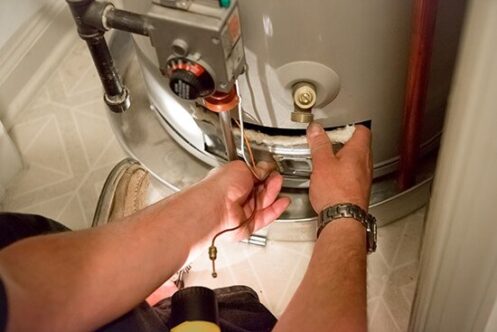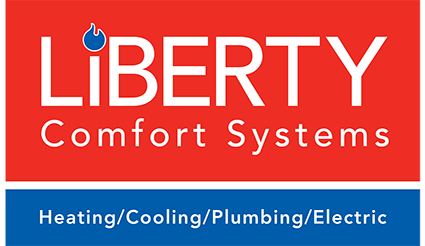
When looking to replace or upgrade your home’s water heater, you have several different options to choose from. It is important that you carefully consider this choice, as each type of water heater has its advantages and drawbacks. Some units are cheaper upfront but will use more energy and possibly cost you more in the long run. Reliability, maintenance, and lifespan are also obviously important things to take into account when choosing what type of water heater is best for your home. With all this in mind, here is an overview of the various types of water heaters and the pros and cons of each type of unit.
Tank Water Heaters
Tank water heaters are still the most common type and are found in a majority of American homes. These units use gas or electricity to heat water inside a large storage tank. Every time any hot water is used, cold water will flow into the tank, and the unit will turn on and start heating. The unit will also need to occasionally turn on to keep the water in the tank at the set temperature, even if no hot water is used for a long time.
The biggest advantage of tank water heaters is the cost. Electric tank heaters are usually the least expensive of all options. Gas tank water heaters are typically a bit more expensive than electric units but will generally be cheaper than any other option.
One of the main issues with tank water heaters is that they are not all that efficient. Having to continually turn on and reheat the water in the tank also wastes quite a bit of energy. As such, a tank water heater will cost more to operate than any other type of unit.
With a tank water heater, you can also easily run out of hot water. When this happens, you will then usually need to wait anywhere from 30 minutes to two hours or more before your water is fully hot again. Tank units also require quite a bit of maintenance and can be prone to leaking or needing repairs.
If the unit isn’t drained or flushed regularly, sediment will build up inside the tank and can affect how well the unit heats and how much energy it uses. Sediment can also damage the heating elements or other components and may lead to the tank corroding and potentially leaking. In some cases, the tank could even rupture and cause all of the water to come rushing out at once.
None of this is to say that a tank water heater is necessarily a bad option. If you’re on a budget, a tank water heater is likely your best option. Even though it will use more energy than most other options, a tank unit will still be cheaper to purchase and install than any other type of water heater.
Tankless Water Heaters
Tankless water heaters are continuing to become increasingly popular as they provide many advantages over tank units. While a gas or electric tankless water heater will cost more upfront, it will almost always use quite a bit less energy and potentially save you money in the long run.
Compared to a tank water heater, a tankless unit will typically use somewhere between 10 and 40% less energy than a tank unit. The exact amount depends mostly on how much hot water you use, as the savings are always greatest if your home typically uses under 40 gallons of hot water on the average day.
Instead of storing hot water, a tankless unit works on demand. Whenever hot water is needed, the unit will turn on and almost instantly heat the water to the desired temperature. Tankless water heaters use something known as a heat exchanger, which is a metal chamber that heats up and transfers the heat to the water flowing over it. The only difference between electric and gas units is that electric units use an electric resistance coil to heat the exchanger, whereas gas units use a gas burner.
Another thing to consider with tankless units is that they typically have a longer lifespan than any other type of unit. Tank water heaters will typically only last between eight and 12 years, whereas tankless units should last for 20 or even 30 years. Tankless water heaters are also lower maintenance and usually require fewer repairs since they have fewer components.
The main drawback to tankless units is the higher price, as they typically cost at least a few hundred dollars more than a tank unit. If you’re switching from a tank to a tankless unit, you will also need to pay extra to have your plumbing retrofitted to accommodate the tankless unit.
Heat Pump Water Heaters
Heat pump water heaters are a much more recent addition to the market. These units work similarly to heat pumps used for space heating. These units use refrigerant to capture heat from the air. The hot refrigerant then flows through a series of coils inside the unit’s tank, and the heat flows out of the refrigerant to keep the water inside the tank hot.
Heat pump water heaters are even more energy efficient than tankless units due to this heat transfer. That being said, both types will typically cost around the same amount to run. This is because heat pump water heaters still have the same energy waste issues as traditional tankless units since they will need to run occasionally whether hot water is being used. These units also typically have a backup electric heating element that may need to run occasionally if the air temperature around the unit is too cold, which will further increase how much energy the unit uses.
Heat pump water heaters are typically one of the most expensive options. They also will usually only last around the same amount of time as a traditional tank unit. They also have the same issues with possibly running out of hot water and needing to be flushed and maintained regularly.
Indirect Water Heaters
An indirect water heater can be a good option if your home has radiant heating. These units also have a large storage tank and work by using the hot water from your boiler to heat the water inside the tank. The water from the boiler runs through a pipe to the tank, where it then flows through a series of coils and then back to the boiler. As with a heat pump water heater, the heat energy flowing through the pipe is transferred to heat the water inside the tank.
The fact that indirect water heaters rely on your boiler means that they work passively and don’t use any energy on their own. This typically makes them the cheapest option both to purchase and to run. The only issue is that your boiler will still need to turn on and run occasionally during the summer to keep the water hot.
If you’re unsure which type of water heater is best, the team at Liberty Comfort Systems can evaluate your home and your hot water needs to help you make a more informed decision. We install a wide range of water heaters, including both tank and tankless units, and we can also take care of your water heater repair and maintenance needs. For more information or to schedule any plumbing, HVAC, or electrical service in the Anoka area, give us a call today.

